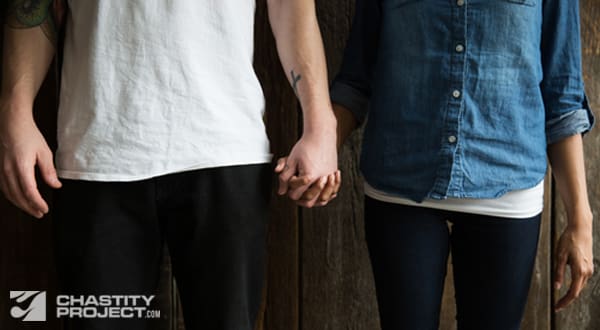
5 Things People Don’t Understand About Chastity
Chastity, as far as I can tell, is one of the most misunderstood words in the English language. People think it’s repressive, degrading and unnatural. But nothing could be further from the truth!
Instead, chastity says that sex, our bodies, and our desires are so good that they are sacred, thus they deserve to be respected and revered. Chastity isn’t about saying “no” or making rules—it’s an enormous YES to authentic love.
1. It’s not abstinence.
The definition of “abstinence” is “to refrain from something.” It would be like telling you not to think about pink elephants. What will that make you think about? Pink elephants!
Instead, where abstinence tells you what not to do, chastity fills in the blanks and gives directions for a full and satisfying life.
Abstinence focuses on the “no.” Chastity is a resounding “yes!” to authentic love and a radical affirmation of the value of our sexuality
2. It’s a lifelong virtue.
People seem to think that chastity is some kind of a once-and-done requirement. It’s not. Chastity is a virtue—the lifelong habit of doing what’s right—just like honesty, patience, or kindness.
Is there a particular age at which people can just stop being honest? When people get married, should they just stop being honest? Nope! Why? Because honesty—a virtue—is a lifelong habit.
The same is true for chastity. Regardless of age or vocation, virtue is meant for everyone. Believe me, that’s a really good thing.
3. Everyone is called to it. Period.
Remember, chastity is a virtue: the habit of doing what’s right with our sexuality. Does it make sense to get married and then suddenly stop doing what’s right with our bodies, minds, and hearts? Not at all!
Chastity looks different for various vocations. Below are the three basic states of life—everyone on the planet can be placed in one of these three categories:
Single.
In this case, “single” means “not permanently committed,” so this includes dating couples. Because single people haven’t made a permanent vow to another person with their words (wedding vows), it’s still too early to make a similar vow with their bodies (sexual intimacy). Thus, at this state, chastity focuses on building healthy relationships that have the potential to turn into strong marriages. This involves dating, growing closer to Christ, knowing oneself, etc.! Thus, chastity for single people does involve abstinence—but it’s much more than that!
Married.
One way married couples practice chastity is through sexual intimacy. Yup. You read that correctly. When two people have made a permanent vow with their souls at the altar, it’s only appropriate for them to make a similar vow with their bodies so that the commitment might involve their entire self. However, marriage also involves times of abstinence for any number of reasons (illness, travel, an exhausted spouse, natural family planning, etc…) and those times of abstinence can also be an expression of love.
Religious Life or Priesthood.
Priests and religious individuals intentionally forego human marriage. Why? Because they’re skipping straight to the divine marriage we’re all created for. Human marriage is simply a reflection of the ultimate union we were created to have with the Trinity. So, just as a husband and wife give all of themselves for each other, priests and religious give all of themselves for Christ and the Church. In this vocation, chastity does involve abstinence, but it also involves a deep, intentional spiritual life, and self-sacrifice.
4. It’s not about limiting happiness.
At its core, chastity is about chasing authentic love. Love—putting another person’s best interest before our own—can involve difficult sacrifices. Naturally then, chastity can be a challenge, too. But sexual intimacy is way better when it’s founded in real love. Real love is worth it and chastity is the way to get there. It’s no surprise that Saint John Paul II said that chastity is the “sure way to happiness.”
5. It’s about freedom.
Most people think that freedom is “doing whatever you want.” But is that true? Can’t our desires sometimes enslave us? Imagine someone who tried cocaine at a party and now can’t stop using it. Cocaine took away any existing freedom. Instead, true freedom is the ability to do what we ought to do. By making good choices, we maintain our ability to make choices at all. Chastity keeps our freedom intact.
_____________________________
 Forest Hempen is an energetic twentysomething who currently resides in Cincinnati, Ohio. She travels as a chastity educator by day and sells clothes to adorable babies by night. Ultimately, Forest hopes to make a living as a Theology of the Body speaker and writer. She’s a die-hard Lord of the Rings fan, an avid geocacher, and a Sherlock wannabe. You can follow her theological ponderings on her blog, follow her more closely on Twitter at @foresthempen, or reach out to her at forest@pc-west.org.
Forest Hempen is an energetic twentysomething who currently resides in Cincinnati, Ohio. She travels as a chastity educator by day and sells clothes to adorable babies by night. Ultimately, Forest hopes to make a living as a Theology of the Body speaker and writer. She’s a die-hard Lord of the Rings fan, an avid geocacher, and a Sherlock wannabe. You can follow her theological ponderings on her blog, follow her more closely on Twitter at @foresthempen, or reach out to her at forest@pc-west.org.